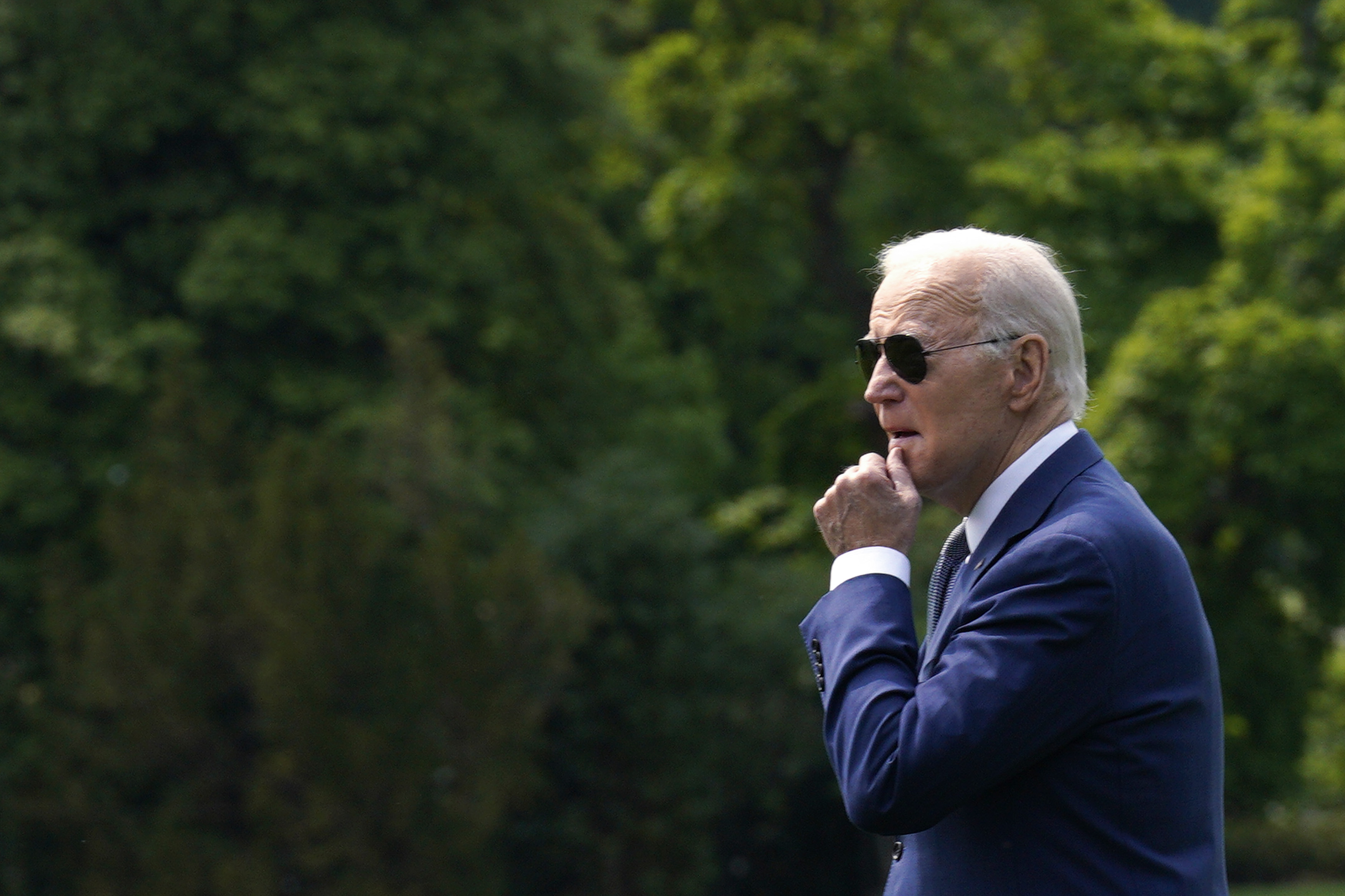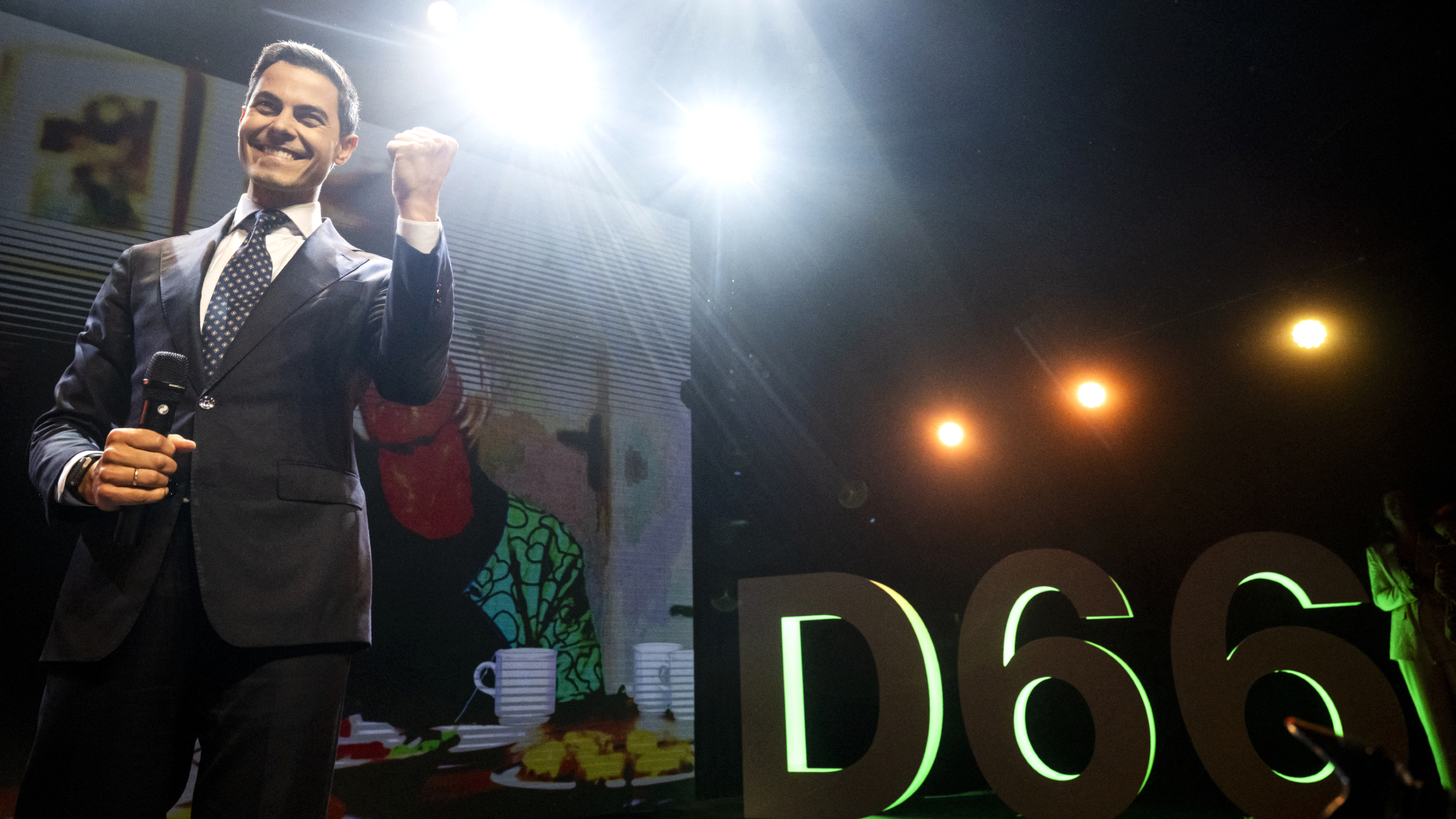Why is Joe Biden running for reelection, anyway?
A look inside the president's consequential decision


A free daily email with the biggest news stories of the day – and the best features from TheWeek.com
You are now subscribed
Your newsletter sign-up was successful
In late April, President Biden brought an end to one of the worst-kept secrets in Washington by announcing officially that, yes, he was indeed running for a second term in office to, as he exclaimed in a campaign launch video, "finish the job." The announcement, while conspicuously telegraphed over the past year or so, would nevertheless have surprised many in the run-up to Biden's 2020 campaign, when aides and insiders widely believed he would serve a single term as a "good transition figure" for a new generation of Democratic leaders, according to one adviser. At some point during the first two years of his presidency, however, that calculus changed, with Biden now campaigning on the promise of continuation, not transition. So why is Joe Biden running for reelection?
There's work to left to do
Despite campaign promises in both 2020 and 2022 to codify the federal abortion access ultimately struck down by the Supreme Court in Dobbs v. Jackson, Biden has thus far been unable to deliver legislative action to ensure reproductive healthcare, stymied, in part, by the 60-vote threshold in the Senate, and the unwillingness from members of his own party to circumvent filibuster rules. To that end, both Biden and Vice President Kamala Harris have prioritized reproductive health messaging in their respective post-campaign launch appearances.
After prioritizing comprehensive immigration reform on his first day in office with the U.S. Citizenship Act of 2021, the president has largely failed to gain momentum on what's shaping up to become one of the major issues of the 2024 race — and critiques of his administration so far. In a speech earlier this year, Biden complained that "congressional Republicans have refused to consider my comprehensive plan." And while legislators are still working on their own possible immigration plan, "my own personal sense ... is that Republicans want the issue more than they want a solution," Sen. Bob Menendez (D-N.J.) said in January.
The Week
Escape your echo chamber. Get the facts behind the news, plus analysis from multiple perspectives.

Sign up for The Week's Free Newsletters
From our morning news briefing to a weekly Good News Newsletter, get the best of The Week delivered directly to your inbox.
From our morning news briefing to a weekly Good News Newsletter, get the best of The Week delivered directly to your inbox.
Biden also conspicuously removed his campaign proposal for free community college from his administration's massive spending bill, admitting in late 2021 that "I don't know of any major change in American public policy that's occurred by a single piece of legislation." But, he stressed at the time, "I'm not going to give up on community colleges as long as I'm president." More broadly, though, Biden has worked to frame his reelection campaign along the same broad theme as the specific community college proposal, touting his bottom-up economic philosophy at a North America's Building Trades Unions event shortly after announcing his 2024 campaign. "We're creating jobs again," Biden told the members. "Manufacturing has come alive again. People can afford decent health care. Towns that have been forgotten and left behind are coming to life again because of you all — what we're doing. Now we've just got to keep going."
It's (mostly) his field for the taking
One of the strongest things Biden has going for his 2024 reelection campaign is his relatively open path to the nomination — a decidedly different situation than the bruising 2020 Democratic primaries that nearly ended his career in politics. Unlike the free-for-all of 2020, however, the coming primary season is in no small part notable for who isn't in a position to challenge the sitting president for his party's nomination, with the "younger generation" of rivals like Harris and Transportation Secretary Pete Buttigieg now "co-opted into his administration," while "the rising generation of Democratic governors" have demurred from entering the race, choosing instead to wait for the "for the post-Biden landscape," wrote the New York Times' Ross Douthat.
Even with the historical rarity of serious challenges to incumbent presidents from within their party, Biden still faces a pair of insurgent contenders; new age author Marianne Williamson, who also ran in 2020, and Robert F. Kennedy Jr, son of the former attorney general of the same name and a major figure in the conspiratorial anti-vaccine movement. While Biden enjoys a comfortable and commanding lead over both challengers, the quirks of the new Democratic presidential primary calendar could play to Williamson and Kennedy's superficial advantage in the short term.
Age is nothing but a number
Already the oldest president in American history, if elected to a second term, Biden would become the first octogenarian to take the presidential oath of office at the age of 81 (two weeks shy of his 82nd birthday). His age, already a point of contention during the 2020 election, has again become fodder for Republicans eager to capitalize on the ongoing debate. But for his part, Biden has welcomed the attention, saying not only that it's "totally appropriate" for voters to question his age, but inverting the criticism into a selling point for his reelection.
A free daily email with the biggest news stories of the day – and the best features from TheWeek.com
"I have acquired a hell of a lot of wisdom and know more than the vast majority of people," Biden bragged during a recent MSNBC interview "I'm more experienced than anybody that's ever run for the office."
Like Ronald Reagan's now-famous quip that he won't "exploit, for political purposes, [his] opponent's youth and inexperience," Biden is "doing exactly what he should be doing. He's embracing it, he's having fun with it," former campaign aide Michael LaRosa explained. "By saying the quiet part out loud, everyone is in on the joke. He knows his age, and he's not pretending to be somebody he's not. And that's the most important quality in a candidate."
With a clean bill of health after his most recent physical, Biden is clearly unbothered by allegations that he's too old for the job, and moreover sees his experience as an asset to be touted, not shied away from.
History repeating
In part, Biden's decision to run for reelection seems animated not only by his own sense of self-motivation, but by what he sees happening on the other end of the political spectrum: Republicans once again rallying around former President Donald Trump as their party's ideological core and presumptive nominee. Casting himself as the candidate who can — and already has — defeat Trump, Biden's campaign launch video made clear with its use of footage from the Jan. 6 Capitol riot that to "finish the job" means in no small part continuing to repudiate the extremism Trump embodies and encourages.
"What Biden has that no one else does is a record" of defeating Trump electorally, a priority that "weighs heavily" among Democrats, David Axelrod, adviser to former President Barack Obama said. And while some, like former GOP Rep. William Hurd, see another Biden/Trump face-off in 2024 as a "rematch from hell," the bottom line for Biden seems to be that he has "already slayed that dragon and I'll slay him again."
That alone is metric enough for Rep. Ro Khanna (D-Calif.), who told Insider that "the question is simply, who will be the best to defeat Trump?" With Biden having "defeated him before," anyone thinking to challenge the president for the nomination would have to "make the case of why they would be better to beat Donald Trump" while carrying states like Wisconsin and Pennsylvania.
Bolstered by that sort of backing, Biden's decision to run for reelection should be seen as more than just his effort to continue the policies he's set in place during his first term in office, but as a proposition — yet to be realized — for the public to once again reject Trump and Trumpism with as little risk as possible.
Rafi Schwartz has worked as a politics writer at The Week since 2022, where he covers elections, Congress and the White House. He was previously a contributing writer with Mic focusing largely on politics, a senior writer with Splinter News, a staff writer for Fusion's news lab, and the managing editor of Heeb Magazine, a Jewish life and culture publication. Rafi's work has appeared in Rolling Stone, GOOD and The Forward, among others.
-
 Why is the Trump administration talking about ‘Western civilization’?
Why is the Trump administration talking about ‘Western civilization’?Talking Points Rubio says Europe, US bonded by religion and ancestry
-
 Quentin Deranque: a student’s death energizes the French far right
Quentin Deranque: a student’s death energizes the French far rightIN THE SPOTLIGHT Reactions to the violent killing of an ultraconservative activist offer a glimpse at the culture wars roiling France ahead of next year’s elections
-
 Secured vs. unsecured loans: how do they differ and which is better?
Secured vs. unsecured loans: how do they differ and which is better?the explainer They are distinguished by the level of risk and the inclusion of collateral
-
 ‘Poor time management isn’t just an inconvenience’
‘Poor time management isn’t just an inconvenience’Instant Opinion Opinion, comment and editorials of the day
-
 Kurt Olsen: Trump’s ‘Stop the Steal’ lawyer playing a major White House role
Kurt Olsen: Trump’s ‘Stop the Steal’ lawyer playing a major White House roleIn the Spotlight Olsen reportedly has access to significant US intelligence
-
 Japan’s Takaichi cements power with snap election win
Japan’s Takaichi cements power with snap election winSpeed Read President Donald Trump congratulated the conservative prime minister
-
 The ‘mad king’: has Trump finally lost it?
The ‘mad king’: has Trump finally lost it?Talking Point Rambling speeches, wind turbine obsession, and an ‘unhinged’ letter to Norway’s prime minister have caused concern whether the rest of his term is ‘sustainable’
-
 How realistic is the Democratic plan to retake the Senate this year?
How realistic is the Democratic plan to retake the Senate this year?TODAY’S BIG QUESTION Schumer is growing bullish on his party’s odds in November — is it typical partisan optimism, or something more?
-
 Memo signals Trump review of 233k refugees
Memo signals Trump review of 233k refugeesSpeed Read The memo also ordered all green card applications for the refugees to be halted
-
 Dutch center-left rises in election as far-right falls
Dutch center-left rises in election as far-right fallsSpeed Read The country’s other parties have ruled against forming a coalition
-
 Has the Gaza deal saved Netanyahu?
Has the Gaza deal saved Netanyahu?Today's Big Question With elections looming, Israel’s longest serving PM will ‘try to carry out political alchemy, converting the deal into political gold’
